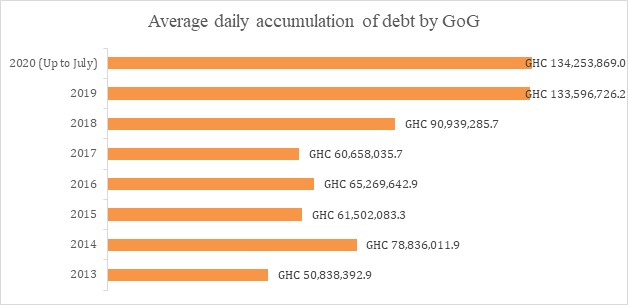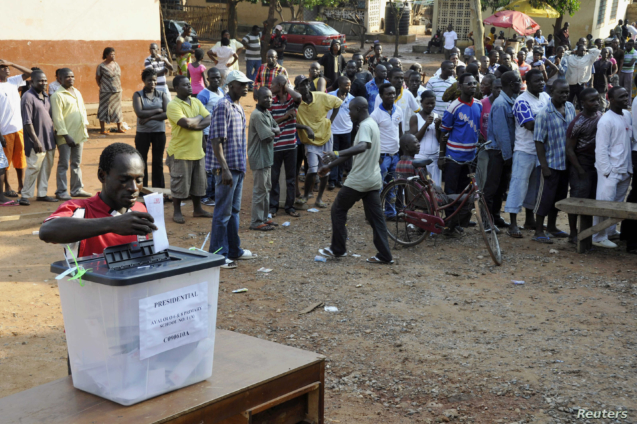When Kojo Yankson opened the phone lines on the Joy Super Morning Show on 28th October 2020 to take listeners’ views on the 2020 elections, the first person to call declared that he was not voting in this year’s elections.
Exactly three weeks earlier, on October 7, 2020, the breakfast show on Citi FM sought to sample the views of Ghanaians regarding the choices in the upcoming 2020 elections.
At the end of the call-in session, a total of 13 people called, out of which six or 46% said they would not vote in the 2020 elections. The No Vote position had more votes than NDC or NPP.
The reality shown by the calls in the two most popular breakfast shows only mirrors what the data had been showing over the years. The latest Afrobarometer report issued in 2019 revealed that an increasing number of people did not want to participate in the election.
Proportions of respondents who could not categorically choose any of the political parties was more than the proportion that chose each of them.
The graph below shows the pattern of increase and the proportion of Ghanaians over the years who said they will not participate in elections.

Apart from the Afrobarometer, data from the Election Commission has shown that averagely something around 26% of registered Ghanaians do not show up to vote during elections.
In 2016, 31% of the electorate did not vote, an 11% increase over the previous election where 20% did not vote.
In other words, in the 2016 elections, for every two people who voted, one did not. It begs the question then, why are most people losing interest repeatedly and increasingly in the electoral process of the country?
Listening to the Citi Breakfast Show, one of the callers, Kabira, intimated that he voted for NDC in 2012, he got disappointed and in 2016 voted for NPP and again he got disappointed, hence his decision not to vote in 2020.
In fact, the same sentiments can be heard in many of the conversations that we've had prior subsequent to the declaration of the operation #NoVote2020 campaign by the Economic Fighters League with the objective of mobilising exposing and weakening the system by which only a few enjoy the resources of the state.
Due to neo-colonialism, the economy of Ghana is still largely controlled by foreign monopoly capital. The wealth from the resources does not benefit the people.
Much of it goes to benefit multinational companies and a small elite while the people wallow in poverty.
One only has to visit Tarkwa and Obuasi, two of the oldest places where gold has been mined for centuries, to appreciate the lack of concern for the people’s welfare despite their faith in this deceptive democracy.
In the latest round of the Ghana Living Standards Survey, it was revealed that 400,000 more people fell below the poverty line between 2012/2013 and 2016/2017, that is a five-year period, which means poverty is on an increasing trend and 80,000 people may be falling below the poverty line every year.
Within the same period, so-called article 71 officeholders, which includes MPs, Ministers, top judges, heads of certain institutions increased their earnings.
The President’s pay increased by 74% while MPs’ pay increased by 50%. They paid themselves ex-gratia of at least GHC 270,000 each and over GHC 9 billion was revealed by the Auditor-General to have been stolen.

Since then, a new report released by the Ghana Statistical Service shows that over 50% of the population is multidimensionally poor.
None of the corruption scandals that got many disappointed in the NDC has been dealt with.
Indeed, not only have more scandals been revealed by the media and the Auditor-General, the Auditor-General has been sacked. Meanwhile debt keeps piling up.
At GHC 263 billion as of July this year, the government borrows GHC 134 million everyday as against GHC 65million in 2016.

So one can understand why people like Kabira and the others have lost faith with voting, for whilst Ghanaians keep voting, our situation rarely improves.
The system is not just bad, it is getting worse with every passing government.
At the same time, a tiny minority keeps amassing and appropriating the collective wealth in ominous proportions and with reckless contempt. So what is the solution?
We in the Economic Fighters League have proffered that the best way to change things is to pause voting and re-evaluate the system itself. The power to steal comes from the people.
We vote for them and they steal, what if we refused to vote again? The question that immediately arises is, what happens if we don’t vote? Not voting not as a result of apathy but a conscious civil action of protest draws the needed attention to the system itself, for if the system remains as it is, NDC and NPP will continue to worsen our lives in turns.
Who we vote for doesn’t. The value has been the same over the years. A deep understanding of the system and its workings among the masses, in turn, will help shift the power of the people from partisan political inclinations to national forward movement.
The central question will not be, which party should I vote for; it will be what sort of system should we have that will work for us all?
There is a tendency for some to think that not voting will not change anything since some will still vote.
This notion is problematic in two ways. First, it is borne out of a misunderstanding of the concept of boycotts.
In 1937, when Gold Coast cocoa farmers could not take being cheated by European companies anymore, it was a boycott they resorted to, refusing to sell their produce and forcing action from the colonial government.
Again in 1948, it was the boycott of European goods that brought heat upon the colonialists and kickstarted the whirlwind of mass actions that gave tempo to the independence movement.
In 1950, the Positive Action declared by Kwame Nkrumah was a combination of boycotts, strikes and demonstrations, pushing the colonial government to organise elections that ushered in the first African-led government in 1951.
Secondly, the #NoVote2020 campaign is not an isolated event but a part of other efforts which have the same ultimate twin goals – bring down the system that only benefits a few and establish a new system that benefits all. To view the boycott as the only activity that will usher in a new era is a misunderstanding of the work of the League.
Some also resort to oft-repeated retorts such as, why don’t you contest for the elections and get the mandate to change things?
Why don’t you take your grievances to court? You see, one of the features of the system we are working to change is its exclusionary nature.
In paper, the constitution makes pronouncements about rights but the same constitution puts in measures that when practised exclude the majority from enjoying those rights.
For example, the constitution purports to guarantee the right to be voted for but gives the Electoral Commission the unfettered discretion to charge fees if someone wants to contest elections as President or Member of Parliament.
Those fees have been used arbitrarily and capriciously to exclude people from low socio-economic backgrounds from participating in the political process. In 2020, to contest as a presidential candidate, one had to pay GHC 100,000 and GHC 10,000 for parliamentary.
In 2016, the amount for presidential was GHC 50,000 and GHC 10,000 for parliamentary. This means for a party to contest elections or field candidates for 275 parliamentarians, it needs GHC 2.75 million.
For candidates who must raise their fees themselves without party support, the extra burden of mobilisation is excruciating.
In a country where high levels of poverty and joblessness exist, how many can really afford to put themselves forward? Or people can only qualify to lead the country if they have deep pockets?
| Filing fees | ||||
| Presidential | % change | Parliamentary | % change | |
| 2000 | ¢500 | 0% | ¢20 | 0% |
| 2004 | ¢500 | 0% | ¢20 | 0% |
| 2008 | ¢5,000 | 900% | ¢500 | 2400% |
| 2012 | ¢10,000 | 100% | ¢1,000 | 100% |
| 2016 | ¢50,000 | 400% | ¢10,000 | 900% |
| 2020 | ¢100,000 | 100% | ¢10,000 | 0% |
With these high fees, large sections of the population are effectively cut off from exercising their inalienable political right to be considered for election to high office. Same with access to justice.
There are thousands suffering in prison and police cells because they can’t afford justice. This is one of the many reasons why the 1992 constitution is a sakawa constitution.
But how will a #NoVote2020 contribute to changing the system? A mass boycott of a national election without regard to partisanship will undoubtedly mobilise the people against the system, united in their resolve to stand for their own interest.
For once, a national conversation will be forced onto the table and the demands for fair representation, for equitable wealth distribution, for social justice, for proportional representation, for economic democracy etc will have significant force behind them and their implementation can no longer be deferred. We will well be on our way to Ghana we want.
The power belongs to the people and the only thing that holds the system in place is the power which has been transferred to a few who then use it to render the people powerless.
To arrest the situation, we must reclaim that power. Continuous voting gives them legitimacy to keep creating, looting and sharing. It makes them complacent and arrogant.
It makes them think that they can do anything to us, after all, we will always vote for them. In 1937, the power of the people was cocoa, they held their power and got results.
In 1948, the power of the people was their money, they held their power and got results. In 1950, the people held their power and they got results. In 2020, our power is our vote, we will get results if we hold it.
Latest Stories
-
To chocolate, Ghana’s pride by Bioko
15 minutes -
Chartered Institute of Bankers, Ghana, confers Honorary Fellow status on Victor Yaw Asante
38 minutes -
BoG marks end of year with Thanksgiving Service
49 minutes -
Ghana’s Next Sports Minister: The Debate Begins
1 hour -
Election 2024: NPP advised to be mindful of the reasons being ascribed to their election lost
1 hour -
GNFS urges Ghanaians to prevent fires during yuletide
1 hour -
Report tobacco users who smoke publicly – FDA advises
2 hours -
Abdallah Ali-Nakyea elevated to Associate Professor at UG School of Law
2 hours -
Kick2build commissions 5 libraries in Klo Agogo, donates school supplies
2 hours -
Slim and Fit Ghana donates to kids at Motherly Love Orphanage in Kwabenya
3 hours -
We’ll be reorganising ourselves for the battles of tomorrow – NPP
3 hours -
Ghanaian teacher Morkporkpor Fiador’s GWR Read-A-Thon attempt postponed
3 hours -
Revocation of licences of UT, Capital banks were strict requirements from IMF – Dr. Addison
3 hours -
MP Cynthia Morrison among 280 members expelled by Agona West NPP
3 hours -
NPP to set up committee to investigate 2024 election defeat – Stephen Ntim
3 hours

